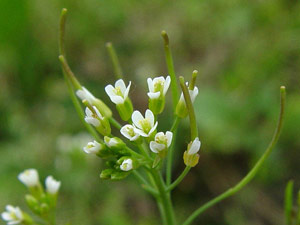Plants are also very cherished
Plants have a harsh life because they must always cope with constraints in the environment such as light, lack of water, salinity of the soil, temperature or resistance to different types of bacteria.

Arabidopsis Thaliana
(Photo: kuleuven-kortrijk)
Biologists know well that plants are very adaptable. Heat, pathogens and other stimuli can increase mutations and repair genes in plants.
Researchers by Dr. Barbara Hohn of Friedrich Miescher Medical Research Institute (Switzerland) have demonstrated that Arabidopsis Thaliana, a cruciferous plant (cabbage, radish) recorded in memory of the events stress and transmission to descendants the ability to adapt to difficult conditions.
To study this phenomenon, Ms. Hohn and her colleagues exposed Arabidopsis Thaliana to an ultraviolet ray or a bacterial protein.
In both cases, the plant reacted by increasing the number of exchanges between two identical gene segments to create genetic diversity . Thanks to this process, lesions in two DNA fragments due to ionizing radiation can be repaired. The researchers noted that this repair ability has been transmitted to the next 4 generations of plants.
WITH
- The project turns trees into multi-purpose biological sensors
- Trees also behave like people
- 80,000 species of plants on Earth are about to become extinct
- There is no brain but plants are smarter than we think
- How is 'that' in plants?
- Extremely hidden carnivorous plants
- 'Discover healthy indoor plants
- These are plants that NASA recommends growing indoors
- 1/5 species of plants in the world are about to become extinct
- Does the plant have sex?
- 600 species of plants disappear, threatening human survival
- Plants do not photosynthesize, do not bloom
 Why do potatoes have eyes?
Why do potatoes have eyes? 'Tragedy' the world's largest carnivorous life: Death becomes ... public toilet
'Tragedy' the world's largest carnivorous life: Death becomes ... public toilet Tomatoes were once considered 'poisonous' for 200 years
Tomatoes were once considered 'poisonous' for 200 years Detecting microscopic parasites on human face
Detecting microscopic parasites on human face